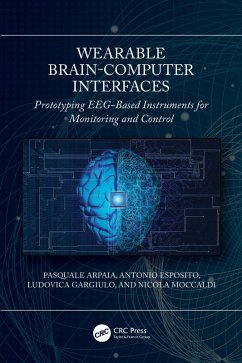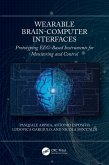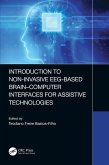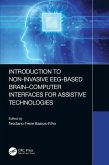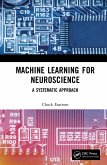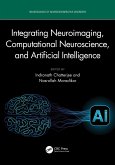Pasquale Arpaia, Antonio Esposito, Ludovica Gargiulo, Nicola Moccaldi
Wearable Brain-Computer Interfaces (eBook, ePUB)
Prototyping EEG-Based Instruments for Monitoring and Control
48,95 €
48,95 €
inkl. MwSt.
Sofort per Download lieferbar

24 °P sammeln
48,95 €
Als Download kaufen

48,95 €
inkl. MwSt.
Sofort per Download lieferbar

24 °P sammeln
Jetzt verschenken
Alle Infos zum eBook verschenken
48,95 €
inkl. MwSt.
Sofort per Download lieferbar
Alle Infos zum eBook verschenken

24 °P sammeln
Pasquale Arpaia, Antonio Esposito, Ludovica Gargiulo, Nicola Moccaldi
Wearable Brain-Computer Interfaces (eBook, ePUB)
Prototyping EEG-Based Instruments for Monitoring and Control
- Format: ePub
- Merkliste
- Auf die Merkliste
- Bewerten Bewerten
- Teilen
- Produkt teilen
- Produkterinnerung
- Produkterinnerung

Bitte loggen Sie sich zunächst in Ihr Kundenkonto ein oder registrieren Sie sich bei
bücher.de, um das eBook-Abo tolino select nutzen zu können.
Hier können Sie sich einloggen
Hier können Sie sich einloggen
Sie sind bereits eingeloggt. Klicken Sie auf 2. tolino select Abo, um fortzufahren.

Bitte loggen Sie sich zunächst in Ihr Kundenkonto ein oder registrieren Sie sich bei bücher.de, um das eBook-Abo tolino select nutzen zu können.
This book presents a complete overview of the main EEG-based Brain-Computer paradigms and the related practical solutions for their design, prototyping, and testing. The book explores active, reactive, and passive BCI paradigms, with a particular emphasis on the operation for developing solutions, addressing the need for customization.
- Geräte: eReader
- mit Kopierschutz
- eBook Hilfe
Andere Kunden interessierten sich auch für
![Wearable Brain-Computer Interfaces (eBook, PDF) Wearable Brain-Computer Interfaces (eBook, PDF)]() Pasquale ArpaiaWearable Brain-Computer Interfaces (eBook, PDF)48,95 €
Pasquale ArpaiaWearable Brain-Computer Interfaces (eBook, PDF)48,95 €![Introduction to Non-Invasive EEG-Based Brain-Computer Interfaces for Assistive Technologies (eBook, ePUB) Introduction to Non-Invasive EEG-Based Brain-Computer Interfaces for Assistive Technologies (eBook, ePUB)]() Introduction to Non-Invasive EEG-Based Brain-Computer Interfaces for Assistive Technologies (eBook, ePUB)48,95 €
Introduction to Non-Invasive EEG-Based Brain-Computer Interfaces for Assistive Technologies (eBook, ePUB)48,95 €![Introduction to Non-Invasive EEG-Based Brain-Computer Interfaces for Assistive Technologies (eBook, PDF) Introduction to Non-Invasive EEG-Based Brain-Computer Interfaces for Assistive Technologies (eBook, PDF)]() Introduction to Non-Invasive EEG-Based Brain-Computer Interfaces for Assistive Technologies (eBook, PDF)48,95 €
Introduction to Non-Invasive EEG-Based Brain-Computer Interfaces for Assistive Technologies (eBook, PDF)48,95 €![Machine Learning for Neuroscience (eBook, ePUB) Machine Learning for Neuroscience (eBook, ePUB)]() Chuck EasttomMachine Learning for Neuroscience (eBook, ePUB)97,95 €
Chuck EasttomMachine Learning for Neuroscience (eBook, ePUB)97,95 €![Computer Vision (eBook, ePUB) Computer Vision (eBook, ePUB)]() Computer Vision (eBook, ePUB)64,95 €
Computer Vision (eBook, ePUB)64,95 €![Integrating Neuroimaging, Computational Neuroscience, and Artificial Intelligence (eBook, ePUB) Integrating Neuroimaging, Computational Neuroscience, and Artificial Intelligence (eBook, ePUB)]() Integrating Neuroimaging, Computational Neuroscience, and Artificial Intelligence (eBook, ePUB)52,95 €
Integrating Neuroimaging, Computational Neuroscience, and Artificial Intelligence (eBook, ePUB)52,95 €![Amyloid and Amyloidosis (eBook, ePUB) Amyloid and Amyloidosis (eBook, ePUB)]() Amyloid and Amyloidosis (eBook, ePUB)64,95 €
Amyloid and Amyloidosis (eBook, ePUB)64,95 €-
-
-
This book presents a complete overview of the main EEG-based Brain-Computer paradigms and the related practical solutions for their design, prototyping, and testing. The book explores active, reactive, and passive BCI paradigms, with a particular emphasis on the operation for developing solutions, addressing the need for customization.
Dieser Download kann aus rechtlichen Gründen nur mit Rechnungsadresse in A, B, BG, CY, CZ, D, DK, EW, E, FIN, F, GR, HR, H, IRL, I, LT, L, LR, M, NL, PL, P, R, S, SLO, SK ausgeliefert werden.
Produktdetails
- Produktdetails
- Verlag: Taylor & Francis eBooks
- Seitenzahl: 286
- Erscheinungstermin: 15. Juni 2023
- Englisch
- ISBN-13: 9781000850574
- Artikelnr.: 68030196
- Verlag: Taylor & Francis eBooks
- Seitenzahl: 286
- Erscheinungstermin: 15. Juni 2023
- Englisch
- ISBN-13: 9781000850574
- Artikelnr.: 68030196
- Herstellerkennzeichnung Die Herstellerinformationen sind derzeit nicht verfügbar.
Pasquale Arpaia earned a master's degree and PhD in Electrical Engineering at University of Napoli Federico II (Italy), where he is a professor of Instrumentation and Measurements. He is Head of the Instrumentation and Measurement for Particle Accelerators Laboratory (IMPALab) and the Augmented Reality for Health Monitoring Laboratory (ARHeMlab). He is Team Leader at European Organization for Nuclear Research (CERN) and Deputy Chairman of the Interdepartmental Center for Research on Management and Innovation of Health (CIRMIS), Head of the Hi-Tech Academic FabLab Unina DIETI and Chairman of the Stage Project of the University Federico II. He was also a professor at University of Sannio, associate at Institutes of Engines and Biomedical Engineering of CNR, and now of INFN Section of Naples. Currently, he is an Associate Editor of the Institute of Physics Journal of Instrumentation, Elsevier Journal Computer Standards & Interfaces, MDPI Instruments, and in the past also of IEEE Transactions on Electronics Packaging and Manufacturing. He was Editor at Momentum Press of the Book Collection "Emerging Technologies in Measurements, Instrumentation, and Sensors". He continuously serves as organizing and scientific committee member in IEEE and IMEKO Conferences. He is plenary speaker in several scientific conferences. His main research interests include instrumentation and measurement for magnets, advanced materials, beam, superconductors, power converters. and cryogenics of particle accelerators, biomedical instrumentation, Augmented Reality, Brain Computer Interfaces, evolutionary diagnostics, distributed measurement systems, ADC modelling and testing. In these fields, he published 3 books, several book chapters, and about 300 scientific papers in journals and national and international conference proceedings.
Antonio Esposito was born in 1993. He received a master's degree in Electronic Engineering from the University of Naples Federico II in 2017 and a Ph.D. in Metrology in 2022 from the Politecnico di Torino. His main research activities focus on the measurement of electroencephalographic signals in wearable brain-computer interfaces. He has been working with visually evoked potentials elicited through smart glasses and he participated in the development of a BCI prototype addressed to both industry and healthcare applications. He is currently studying extended reality applications exploiting either evoked or spontaneous brain activity.
Ludovica Gargiulo received a M.S. Degree (cum laude) in Biomedical Engineering at the University of Naples Federico II in 2020. She is currently a Ph.D. student in Information and Communication Technology at the University of Naples Federico II. Her research interests include "Brain-Computer Interfaces" for daily-life applications and biosignal measurement and processing for biomedical applications with a focus on Evoked-Related Potential elicited by cognitive tasks.
Nicola Moccaldi received a M.A. degree in Communication Science at the University of Salerno, the M.Sc. degree in Electronic Engineering and a Ph.D. in Information Technologies and Electrical Engineering at the University of Naples Federico II. Currently he is Senior Researcher of ARHeMLab of DIETI Excellence Department (Laboratory of Augmented Reality for Health Monitoring). His research interests include biomedical instrumentation and measurement. In this field, he published several scientific papers in journals and national and international conference proceedings.
Antonio Esposito was born in 1993. He received a master's degree in Electronic Engineering from the University of Naples Federico II in 2017 and a Ph.D. in Metrology in 2022 from the Politecnico di Torino. His main research activities focus on the measurement of electroencephalographic signals in wearable brain-computer interfaces. He has been working with visually evoked potentials elicited through smart glasses and he participated in the development of a BCI prototype addressed to both industry and healthcare applications. He is currently studying extended reality applications exploiting either evoked or spontaneous brain activity.
Ludovica Gargiulo received a M.S. Degree (cum laude) in Biomedical Engineering at the University of Naples Federico II in 2020. She is currently a Ph.D. student in Information and Communication Technology at the University of Naples Federico II. Her research interests include "Brain-Computer Interfaces" for daily-life applications and biosignal measurement and processing for biomedical applications with a focus on Evoked-Related Potential elicited by cognitive tasks.
Nicola Moccaldi received a M.A. degree in Communication Science at the University of Salerno, the M.Sc. degree in Electronic Engineering and a Ph.D. in Information Technologies and Electrical Engineering at the University of Naples Federico II. Currently he is Senior Researcher of ARHeMLab of DIETI Excellence Department (Laboratory of Augmented Reality for Health Monitoring). His research interests include biomedical instrumentation and measurement. In this field, he published several scientific papers in journals and national and international conference proceedings.
Part 1: Background. 1. Electroencephalography
based Brain
Computer Interfaces. 2. Design of Daily
life Brain
Computer Interfaces. Part 2: Reactive Brain
Computer Interfaces. 3. Fundamentals. 4. SSVEP
based Instrumentation. 5. Case Studies. Part 3: Passive Brain
Computer Interfaces. 6. Fundamentals. 7. EEG
Based Monitoring Instrumentation. 8. Case Studies. Part 4: Active Brain
Computer Interfaces. 9. Fundamentals. 10. Motor Imagery
Based Instrumentation. 11. Case Studies.
based Brain
Computer Interfaces. 2. Design of Daily
life Brain
Computer Interfaces. Part 2: Reactive Brain
Computer Interfaces. 3. Fundamentals. 4. SSVEP
based Instrumentation. 5. Case Studies. Part 3: Passive Brain
Computer Interfaces. 6. Fundamentals. 7. EEG
Based Monitoring Instrumentation. 8. Case Studies. Part 4: Active Brain
Computer Interfaces. 9. Fundamentals. 10. Motor Imagery
Based Instrumentation. 11. Case Studies.
Part 1: Background. 1. Electroencephalography
based Brain
Computer Interfaces. 2. Design of Daily
life Brain
Computer Interfaces. Part 2: Reactive Brain
Computer Interfaces. 3. Fundamentals. 4. SSVEP
based Instrumentation. 5. Case Studies. Part 3: Passive Brain
Computer Interfaces. 6. Fundamentals. 7. EEG
Based Monitoring Instrumentation. 8. Case Studies. Part 4: Active Brain
Computer Interfaces. 9. Fundamentals. 10. Motor Imagery
Based Instrumentation. 11. Case Studies.
based Brain
Computer Interfaces. 2. Design of Daily
life Brain
Computer Interfaces. Part 2: Reactive Brain
Computer Interfaces. 3. Fundamentals. 4. SSVEP
based Instrumentation. 5. Case Studies. Part 3: Passive Brain
Computer Interfaces. 6. Fundamentals. 7. EEG
Based Monitoring Instrumentation. 8. Case Studies. Part 4: Active Brain
Computer Interfaces. 9. Fundamentals. 10. Motor Imagery
Based Instrumentation. 11. Case Studies.
